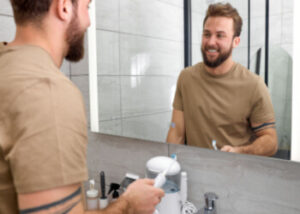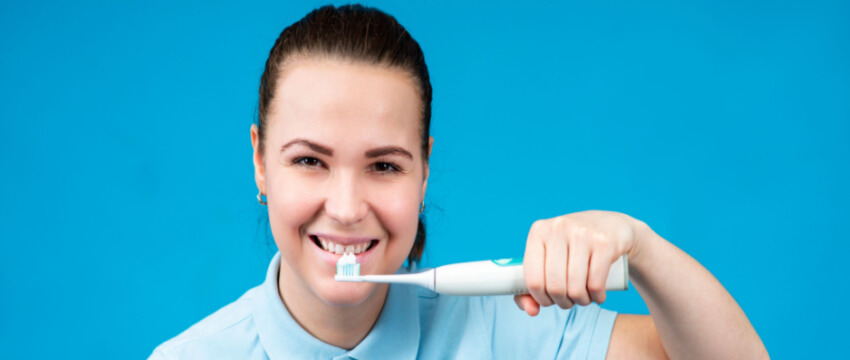How Does An Electric Toothbrush Work?
High-frequency cleaning
Electric toothbrushes like sonic and fusion toothbrushes work by emitting very high frequencies. The high frequencies massage and stimulate your salivary glands so that they produce more saliva.
Vibrating and rotating heads
Electric toothbrush heads rotate and vibrate, giving you more brush strokes when you clean. The small bristles of electric toothbrushes move around hundreds of times per minute, brushing away plaque with every rotation. They move much faster and more times than a human hand can achieve with a manual toothbrush.
Fusion technology
The fusion technology that combines sonic toothbrushes with Waterpik technology ensures that more plaque is removed and rinsed from your mouth every time you clean. Waterpiks remove plaque build-up from below your gum line and between your teeth and can be used as a gentler alternative to traditional string floss.
How Does An Electric Toothbrush Work To Do A Superior Job At Cleaning Teeth?
The Benefits Of Using An Electric Toothbrush
Using an electric toothbrush gives you greater control over your oral health. The introduction of technology means you can be more focused and do a more effective job at plaque control and removal. Here are some of the benefits of electric toothbrushes over manual brushes.
They have built-in timers
When you’re rushing to get to work or too tired to pay attention, the mandated two-minute rule is easily forgotten about. When you use an electric toothbrush you can take advantage of the in-built timer to make sure you are brushing for long enough.

Sometimes we think that brushing harder can compensate for not brushing for long enough, or that if we apply more pressure, it will remove more plaque. But, brushing too hard can wear away at your dental enamel and even at your gums.
Most electric toothbrushes have pressure sensors that alert you when you’re brushing too hard.
They can improve oral health in patients with restorations
If you have lost a tooth due to dental decay you probably would like the peace of mind that it won’t happen again. Using an electric toothbrush can ensure that you clean around your dental implants, bridgework, and dental crowns more effectively.
They can improve dental health in patients with orthodontics
If you wear braces, it’s really important to keep your teeth and orthodontics clean and plaque-free. It’s also really difficult to do that when wires and brackets are in the way. Electric toothbrushes can make a complicated task much faster and easier. Their specialised vibrating and rotating heads make sure that debris, trapped food, and plaque are removed from the braces effectively.
They are ideal for children
Using a toothbrush requires you to have good motor control and young children haven’t always developed the skills required to manoeuver a toothbrush properly. By using sonic and fusion technology you can literally give your child a helping hand without getting in the way.
They are ideal for people with impaired mobility
Not everyone can use their hands fully, or with comfort. People who have arthritis, carpal tunnel syndrome and Parkinson’s disease may have limited mobility in their hands and fingers. This can make it difficult and even painful to use a toothbrush effectively. Even so, people with limited mobility have the same dental hygiene needs. By using an electric toothbrush you do not have to compromise on your standard of oral care.
How To Use Electric Toothbrushes For Better Oral Hygiene
Even though an electric toothbrush makes use of technology to give you a superior clean, you have to use it correctly to realise the full benefits.
Using gentle, short strokes and applying the right amount of pressure is important. You must clean each tooth thoroughly, making sure you give attention to the front, back, and bite surfaces, and do not neglect to clean along your gum line.
Don’t Forget To Floss
Flossing is just as important as brushing twice a day. It doesn’t matter whether you floss before or after you brush, as long as you do it. This is because flossing makes sure you clean the areas of your mouth that your toothbrush can’t reach. Even electric toothbrushes bristles are not small enough to clean the spaces between your teeth.
Don’t Forget To Clean Your Tongue Twice A Day
Your tongue is as exposed to bacteria and plaque as any other surface in your mouth. Most electric toothbrushes have built-in tongue cleaners to help you remove more bacteria and plaque from every clean.
Don’t Forget To Visit Your Dentist Twice A Year
Even if you are using an electric toothbrush, you need to visit your dentist twice a year. Your dentist will check on your gum health and inspect your teeth for cavities. Picking up cavities when they are small protects you against future tooth decay and ultimately against tooth loss. Your dentist has specialised equipment so he or she can see what’s happening in the back of your mouth. He can also take x-rays when needed to make sure your teeth roots are healthy and to check on your wisdom teeth.
To find out more about how does an electric toothbrush work or for oral hygiene tips, please contact us for a convenient appointment: (02) 9159 6237.
REFERENCES
What is Sonic Toothbrush?
https://www.colgate.com/en-us/oral-health/selecting-dental-products/what-is-a-sonic-toothbrush
Is It Better to Use an Electric or a Manual Toothbrush?
https://www.healthline.com/health/dental-and-oral-health/electric-toothbrush-vs-manual

